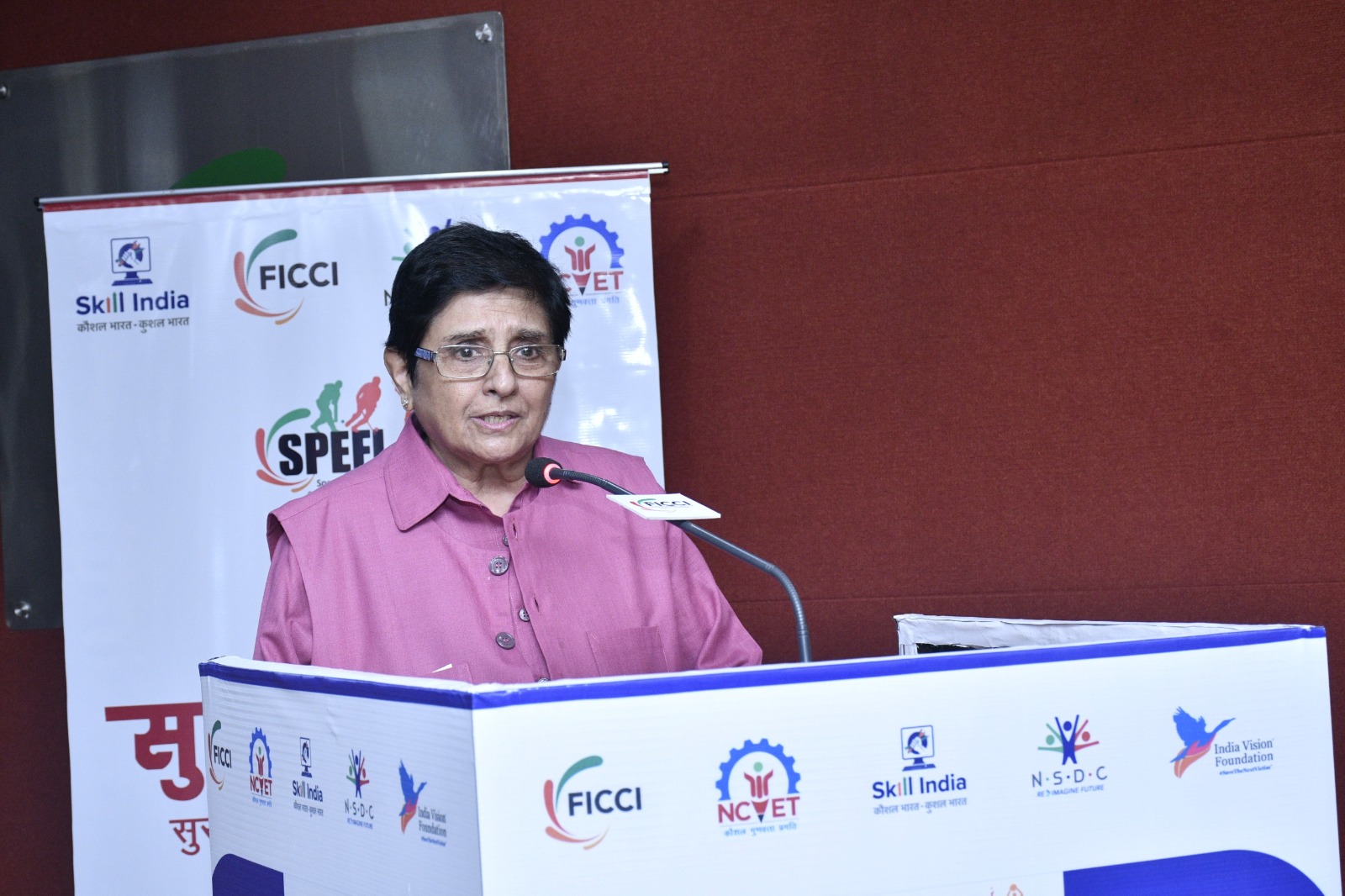by Suman Gupta
New Delhi, October, 2023: The need for a well-designed self-defense training programme for women in India is well documented. Unfortunate as that maybe, India is now on the verge of launching a unique self-defense programme, that will be at a national level, and will also be made available virtually, by SPEFL-SC (Sports, Physical Education, Fitness and Leisure Skills Council).
The virtual programme will be launched by none other than Kiran Bedi, who is India’s first woman IPS Officer, the former Lt. Governor of Puducherry and Founder of the India Vision Foundation. Also present on the august occasion was Jalaj Dani (President Emeritus, SPEFL-SC), Neeraj Jain (President, SPEFL-SC), Poonam Sharma (Vice-President, FICCI Ladies Organisation), Dr Anubhuti Chauhan (President, Arunodaya Foundation) and Tahsin Zahid (CEO, SPEFL-SC).
 The self-defense programmes originated from the thoughts of putting into practice various techniques that would help women remain fit and agile, such that they can take on any given situation, no matter how uncomfortable it may be. The Ministry of Skill Development has approved a national curriculum which will be delivered by certified trainers.
The self-defense programmes originated from the thoughts of putting into practice various techniques that would help women remain fit and agile, such that they can take on any given situation, no matter how uncomfortable it may be. The Ministry of Skill Development has approved a national curriculum which will be delivered by certified trainers.
 “Teaching to defend is something that is very important, and like yoga it should become an integral part of our national education policy, and we should tell the Government of India to move accordingly. Make self-defense for girls mandatory. We must make this a school programme, just like sports and yoga. We need to create an ecosystem for the woman who is vulnerable, and we have to strive towards this. If we want to be in a place where our women and girls are safe, we need an ecosystem, that allows them to feel free,” said Kiran Bedi.
“Teaching to defend is something that is very important, and like yoga it should become an integral part of our national education policy, and we should tell the Government of India to move accordingly. Make self-defense for girls mandatory. We must make this a school programme, just like sports and yoga. We need to create an ecosystem for the woman who is vulnerable, and we have to strive towards this. If we want to be in a place where our women and girls are safe, we need an ecosystem, that allows them to feel free,” said Kiran Bedi.
While many programmes teach martial arts as a form of self-defense, the national curriculum, which is anchored and pioneered by SPEFL-SC, takes on a different approach, placing utmost importance on situational awareness, dialogue and finally, combat and run. Combat training is developed basis research on the various ways a woman might find herself and then the many responses they can use to tackle the situation.
With the blessings of the Indian Government, the training programmes for women were launched in 2021, and since then has gone on to conduct more than 20,000 training programmes with certified trainers involved in the process. The programmes have traversed across the length and breadth of the nation, from Jammu Kashmir to Karnataka, including states such as Bihar, Uttar Pradesh and Madhya Pradesh too.
“We should always engage in activities and initiatives that promote safety of women. We must exercise caution and responsibility in our online activities, protecting our personal information and being aware of the potential risk associated with the digital realm. When women feel secure, they can conquer the world. When women feel secure, they are most likely to enter the workforce, start business and contribute to the country’s growth. I must congratulate SPEFL-SC for creating this self-defense model which is based on the best of the systems in the world,” said Poonam Sharma.
“Self-defence is a very essential nowadays, and it is very important that those who need the guidance on this is given a proper grounding. Because without that, it can be very difficult to tackle a situation. And it is very essential to make this available to everyone in our country. We would like to thank Kiran Bedi for associating with this initiative. She is an inspiring personality and one of the foremost minds in terms of women’s safety and self-defence,” said Tahsin Zahid.
About SPEFL-SC : Sports, Physical Education, Fitness and Leisure Skills Council (SPEFL-SC) is an autonomous industry led body, a not-for-profit organisation, promoted by Ministry of Skill Development and Entrepreneurship (MSDE), National Skill Development Corporation (NSDC) and FICCI.
The council within their sector and sub-sectors is responsible to create Occupational Standards and Qualification packs, develop competency framework, conduct Train the Trainer Programs, conduct skill gap studies and Assess and Certify trainees on the curriculum aligned to National Occupational Standards developed by them.
